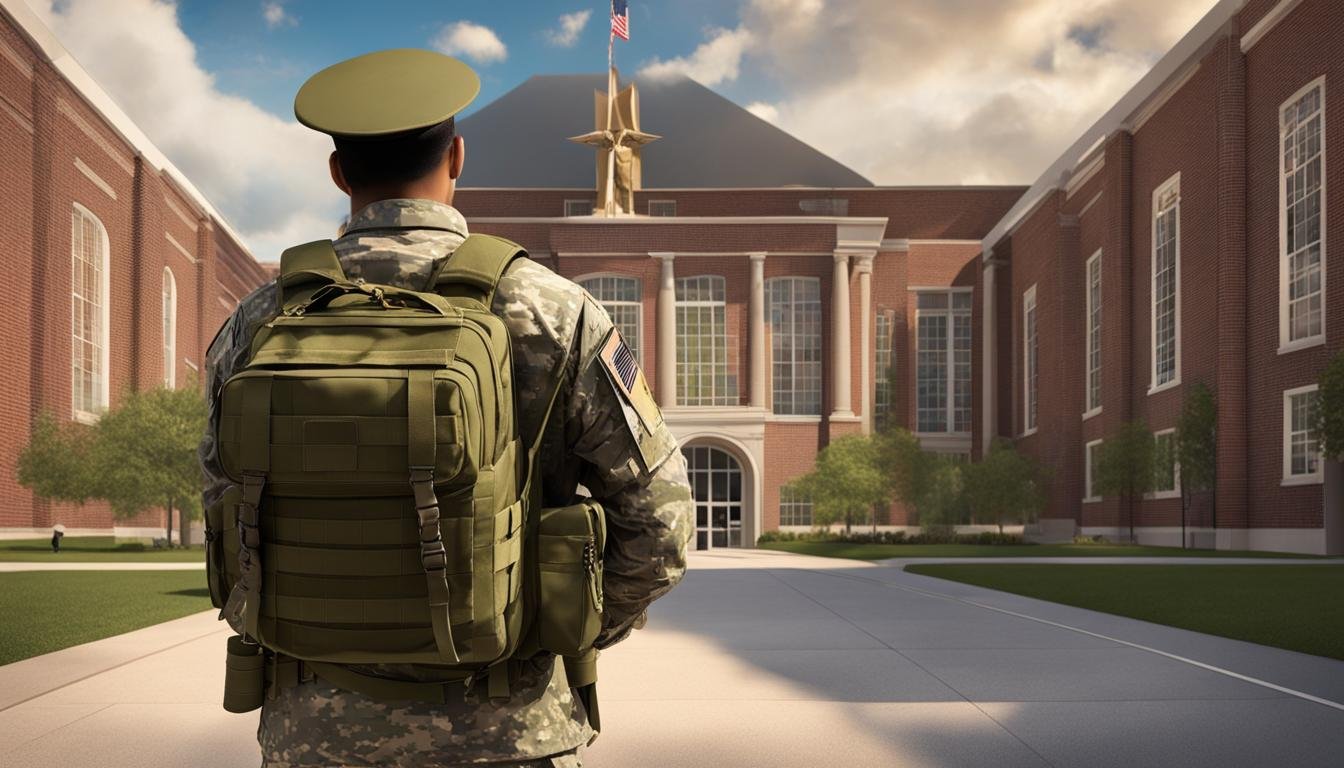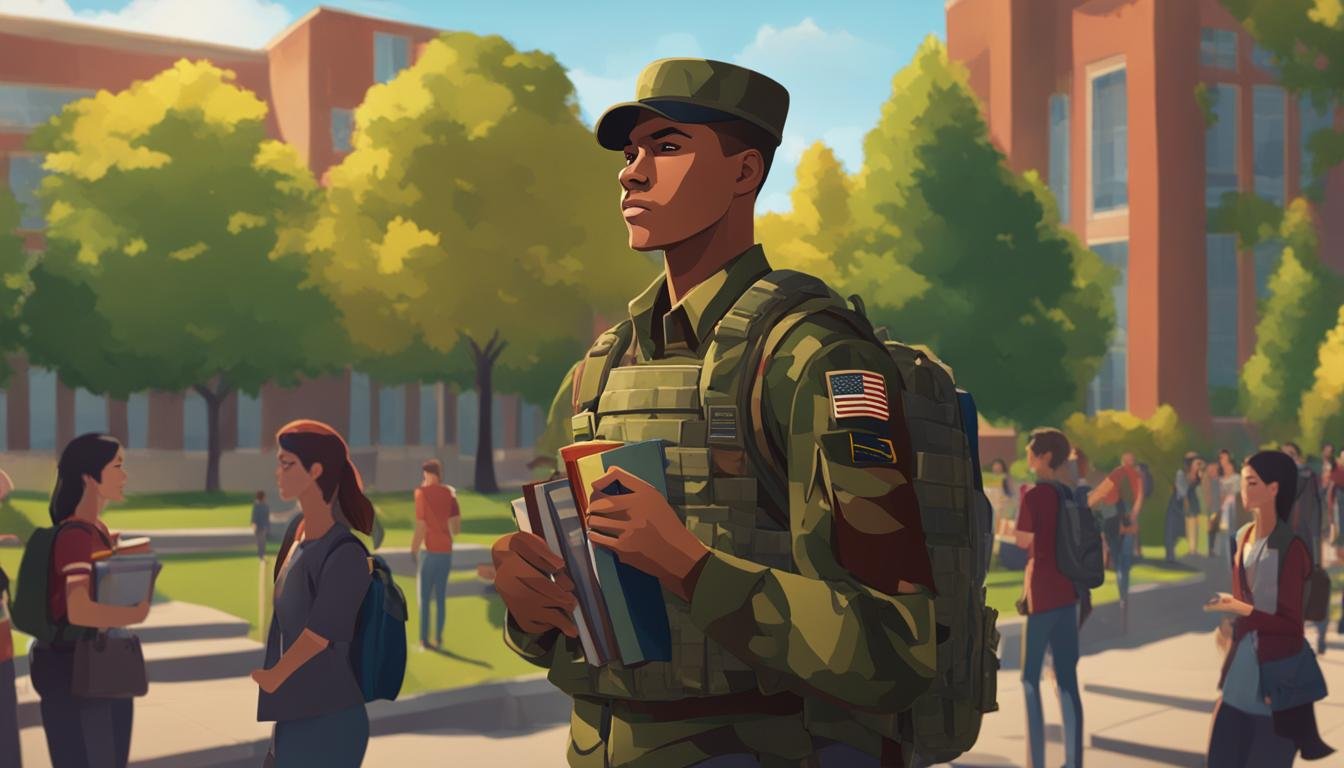Military students in college face unique challenges that can significantly impact their academic performance and overall well-being. The demands of juggling military responsibilities and coursework, along with the potential for experiencing trauma-related issues, can create high levels of stress. However, there are effective strategies that military students can employ to manage and reduce stress, enabling them to thrive in both their military and academic pursuits.
Key Takeaways:
- Recognize the signs of stress and seek help when needed.
- Take control of the situation by identifying stressors and developing coping mechanisms.
- Practice relaxation techniques such as meditation and deep breathing exercises.
- Set realistic goals and prioritize tasks to avoid becoming overwhelmed.
- Engage in physical activity and help others to alleviate stress and enhance well-being.
Challenges Faced by Military Students in College

Military students transitioning to college often encounter a range of unique challenges that can impact their academic success and overall well-being. These challenges include mental health issues, adjustment difficulties, cognitive impairments, social isolation, and high dropout rates.
Mental health issues are prevalent among military students and can include conditions such as posttraumatic stress disorder (PTSD), traumatic brain injury (TBI), anxiety, and depression. These conditions can significantly impact their ability to cope with the demands of college life and may require specialized support and intervention.
Adjustment difficulties can arise as military students transition from the highly structured military environment to the more independent and flexible college setting. The unfamiliarity of the college experience, with its academic demands, new social dynamics, and different support systems, can be overwhelming for many military students.
Cognitive impairments resulting from military service, such as difficulties with memory, attention, and executive functioning, can present additional challenges in the academic setting. These impairments may require accommodations and support to help military students effectively manage their coursework and succeed academically.
Moreover, military students may also experience social isolation on campus. They may struggle to connect with their civilian peers due to differences in life experiences, values, and interests. This isolation can further exacerbate feelings of alienation and negatively impact mental health and academic performance.
Unfortunately, these challenges contribute to higher dropout rates among military students compared to their non-military peers. Recognizing and addressing these issues is crucial to ensure the success and well-being of military students in college.
Mental Health Issues for Military Students
Military students are at a higher risk for mental health issues compared to their non-military peers. The experiences and traumas associated with military service can lead to conditions such as posttraumatic stress disorder (PTSD), traumatic brain injury (TBI), anxiety, and depression. These mental health issues can have a significant impact on a military student’s ability to cope with the demands of college life and can contribute to challenges in academic performance and overall well-being.
Adjustment Difficulties for Military Students
Military students face unique adjustment difficulties as they transition from the highly structured military environment to the more independent and flexible college setting. The new academic expectations, social dynamics, and support systems can be overwhelming and unfamiliar to military students. It is important for colleges and universities to provide targeted support and resources to help military students successfully navigate these challenges and adjust to college life.
Cognitive Impairments in Military Students
Many military students may experience cognitive impairments resulting from their service, such as difficulties with memory, attention, and executive functioning. These impairments can present additional challenges in the academic setting, making it harder for military students to manage their coursework and succeed academically. Providing accommodations and support tailored to the needs of military students with cognitive impairments is crucial to their academic success.
Social Isolation for Military Students
Military students often face social isolation on college campuses, as they may struggle to connect with their civilian peers due to differences in life experiences, values, and interests. This isolation can contribute to feelings of alienation, loneliness, and negatively impact mental health and academic performance. Creating inclusive and supportive environments that foster connections among military and civilian students is essential for addressing social isolation among military students.
High Dropout Rates for Military Students
Unfortunately, the challenges faced by military students in college contribute to higher dropout rates compared to their non-military peers. Without adequate support and interventions, military students may struggle to navigate the academic and social demands of college life. It is crucial for colleges and universities to prioritize the unique needs of military students and provide comprehensive support programs to ensure their academic success and well-being.
How Can Military Students Manage Stress During their Transition to College?
Military students can manage stress during their transition to college by following some helpful tips for military transition. These include connecting with other veterans on campus, accessing support services, setting realistic goals, and practicing self-care. It’s important for these students to seek help and navigate the challenges of this new chapter in their lives.
Effective Stress Management Strategies for Military Students in College
Managing stress is crucial for military students in college to maintain their academic performance and overall well-being. Here are some effective stress management strategies specifically tailored for military students:
Mind-Body Interventions:
Engaging in mind-body interventions can help reduce stress levels. Practices such as meditation, deep breathing exercises, and mindfulness techniques have been shown to have a positive impact on managing stress. These techniques promote relaxation and can provide a sense of calm amidst the demands of college life.
Resilience Training:
Participating in resilience training programs can equip military students with valuable coping skills and stress appraisal techniques. These programs focus on building emotional resilience and teach strategies to effectively navigate stressors. Developing resilience can enhance their ability to adapt and thrive in challenging situations.
Support Systems:
Building a strong support system is crucial for military students in college. Surrounding yourself with family, friends, and fellow military students who understand the unique challenges you face can provide a sense of belonging and emotional support. Having a support network to lean on during difficult times can greatly reduce stress levels.
Stress Management Programs:
Colleges and universities should offer stress management programs specifically tailored for military students. These programs can provide valuable tools, resources, and guidance to help military students effectively manage stress. By addressing their unique needs and challenges, these programs can contribute to their overall well-being and academic success.
By implementing these stress management strategies, military students in college can better navigate the challenges they face and maintain a healthy balance between their education and personal lives. Remember, seeking professional help is essential if stress becomes unmanageable and interferes with your well-being or academic journey.



